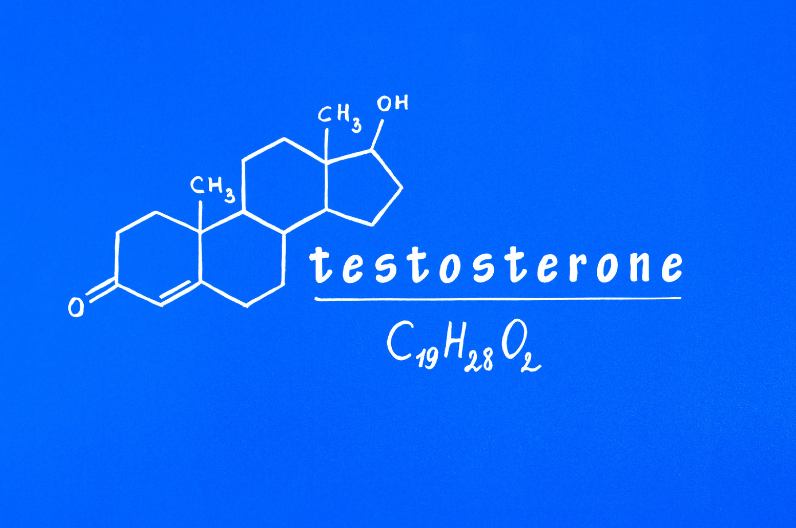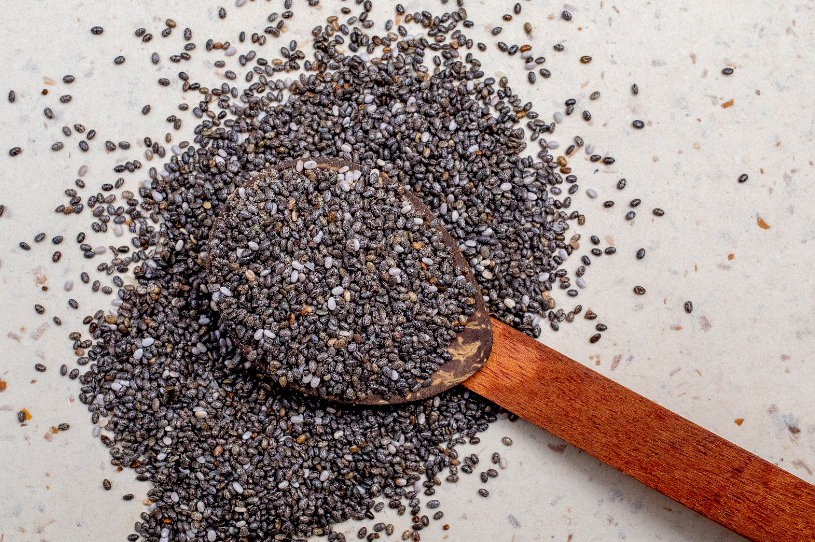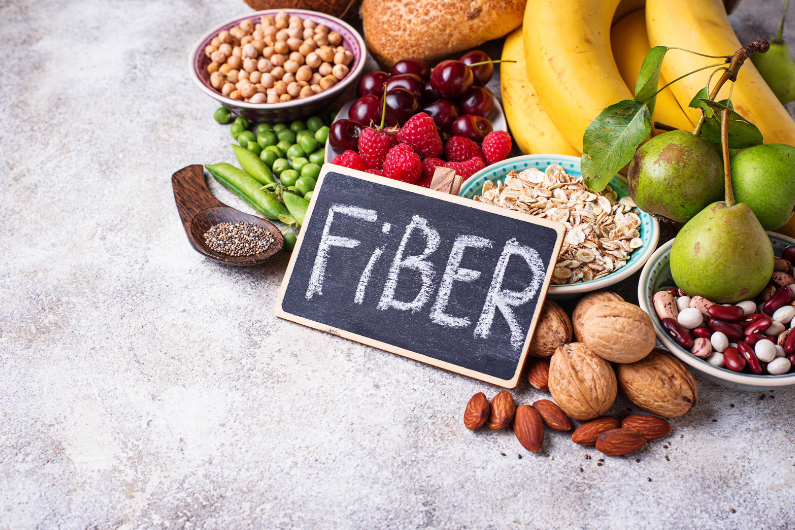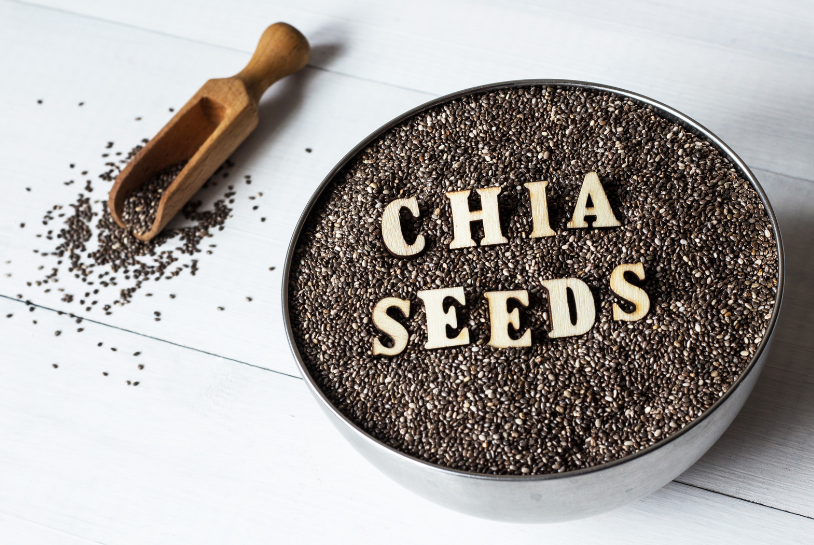A balanced diet, rich in protein and healthy fats, such as chia seeds, can help boost your testosterone levels.
In the realm of nutrition and health, misinformation often circulates, leading to confusion and misconceptions. One such topic that has sparked debate is whether chia seeds have an impact on testosterone levels.
Testosterone, a crucial hormone in both men and women, plays a vital role in various physiological processes, including muscle development, bone density, maintaining healthy testosterone levels, and overall well-being.
Incorporating chia seeds into the diet can support brain health through omega-3 fatty acids, enhance cognitive function, and contribute to overall well-being by offering essential nutrients for heart health and energy to maintain healthy testosterone levels. This blog aims to delve into the science behind chia seeds and their alleged impact on testosterone levels, separating fact from fiction.
Understanding Testosterone

Before exploring the relationship between chia seeds and boost testosterone production, it’s essential to grasp the basics of this hormone. Testosterone is primarily produced in the testes in males and ovaries in females, although smaller amounts are also synthesized in the adrenal glands. In males, it plays a key role in the development of reproductive tissues, sperm production (sperm counts), and the growth of facial and body hair during puberty. Additionally, testosterone contributes to muscle mass, bone density, and overall vitality in both sexes. Maintaining healthy testosterone levels is crucial for overall health. Certain foods, such as mint and soy, can cause a decrease in testosterone levels due to compounds like menthol and phytoestrogens.
Chia Seeds Nutritional Profile

Chia seeds, derived from the Salvia hispanica plant, have gained popularity as a superfood due to their impressive nutritional profile. Rich in omega-3 fatty acids, healthy fats, fiber, protein, and various vitamins and minerals, chia seeds are known for their potential health benefits. They are often promoted for their ability to support heart health, down cholesterol levels aid in weight management, and provide sustained energy.
Dispelling the Myth
Despite the numerous positive attributes associated with chia seeds, a myth has emerged suggesting that they may lower testosterone levels. It is important to be aware of foods that lower testosterone and their potential impact on overall health. Various online sources and anecdotal claims have perpetuated this notion. However, when we turn to scientific evidence, a different picture emerges.
Chia Seeds and Omega-3 Fatty Acids
One of the key components of chia seeds contributing to their health benefits is omega-3 fatty acids. These essential fats are known for their anti-inflammatory properties and are crucial for overall well-being. Some studies suggest that omega-3 fatty acids may have a positive impact on testosterone levels, particularly in men, add chia seeds helping to boost your testosterone levels.
A study published in the “Journal of Clinical Endocrinology & Metabolism” explored the relationship between omega-3 fatty acids and testosterone levels. The findings suggested that omega-3 supplementation was associated with an increase in testosterone production. While this doesn’t specifically address chia seeds, it underscores further research into the potential positive influence of omega-3 fatty acids on testosterone.
Fiber Content and Hormonal Regulation

Chia seeds are also renowned for their high fiber content, which has been linked to various health benefits, including improved digestion and weight management. Some studies propose that dietary fiber may play a role in hormonal regulation, including the balance of sex hormones like testosterone. Additionally, the soluble fiber in chia seeds can help stabilize blood sugar levels, reducing the risk of type 2 diabetes.
A review published in the “American Journal of Clinical Nutrition” discussed the potential impact of dietary fiber on sex hormone levels. While the study did not specifically focus on chia seeds, it highlighted the intricate relationship between dietary fiber intake and hormonal balance. The review suggested that fiber could influence sex hormone levels by affecting the metabolism and excretion of hormones. However, more research is needed to establish a direct link and determine the specific effects of chia seeds.
Antioxidant Properties and Hormonal Health
Chia seeds boast antioxidant properties, which contribute to their ability to combat oxidative stress in the body. Oxidative stress has been implicated in various health issues, including hormonal imbalances. By reducing oxidative stress, chia seeds may indirectly support hormonal health. Antioxidants can also support the production of testosterone, which is crucial for enhancing physical performance muscle growth and overall well-being.
A study published in the “Journal of Food Science” investigated the antioxidant capacity of chia seeds. The findings indicated that chia seeds exhibited significant antioxidant activity. While antioxidants alone may not directly impact testosterone levels, their role in promoting overall health and mitigating factors that contribute to hormonal imbalances decrease testosterone levels should not be overlooked.
Phytoestrogens in Chia Seeds

One aspect of chia seeds that has been scrutinized in the context of hormone levels is their phytoestrogen content. Phytoestrogens are plant compounds with a structure similar to estrogen, the primary female sex hormone. Some people express concerns that consuming foods high in phytoestrogens may lead to hormonal disruptions, including a potential decrease in testosterone levels.
However, it’s crucial to recognize that the effects of phytoestrogens on hormone levels are complex and can vary based on individual factors. A review published in “Nutrients” explored the impact of phytoestrogens-free testosterone alone on male reproductive health. The study concluded that the relationship between phytoestrogen intake and testosterone levels is not fully understood and may be influenced by factors such as age, health status, and overall dietary patterns.
Chia seeds do contain phytoestrogens, or testosterone foods but the concentration is relatively low compared to other sources. Additionally, research on the effects of phytoestrogens from foods like chia seeds on testosterone levels specifically is limited. Phytoestrogens can also impact sperm motility, as highlighted in studies examining various health benefits.
Frequently asked questions
What seeds lower testosterone?
Aside from Chia Seeds, some of the seeds commonly associated with lowering testosterone include Flaxseeds, Soybeans (and Soy Products), and Sesame Seeds. Flaxseeds and chia seeds contain lignans, and phytoestrogens that may lower testosterone. Soybeans, while not seeds, have isoflavones, another phytoestrogen with similar effects. Sesame seeds also contain lignans, though their impact on hormones is less certain.
Which seed is best for testosterone?
Ginger, Spinach, Pumpkin Seeds, and Maca are considered the best for supporting testosterone levels due to their high zinc content, healthy fats, and antioxidants, all of which contribute to maintaining and boosting testosterone.
Are chia seeds good for males?
Chia seeds for testosterone and Chia seeds boost testosterone and benefit men when consumed as part of a balanced and varied diet and offer a multitude of health benefits. The positive attributes of omega-3 fatty acids, fiber, and antioxidants found in chia seeds may even contribute to overall well-being, including potential support for hormonal balance. Additionally, chia seeds can increase testosterone levels due to their nutrient profile. The importance of vitamin D in supporting testosterone levels should also be noted, with sources such as beef liver, tuna, and eggs being beneficial.
What are some foods that lower testosterone?
Certain foods may lower testosterone levels due to their nutrient content or hormonal effects. These foods that cut testosterone include soy and soy products (due to isoflavones), mint (particularly spearmint), flaxseeds (rich in lignans), licorice root (contains glycyrrhizin), processed foods (high in trans fats and sugar), alcohol (especially beer), high-PUFA oils (like corn and soybean oil), and some dairy products. While moderation may minimize their impact, excessive alcohol consumption could potentially lower testosterone levels.
Conclusion
In conclusion, the idea of how does chia seeds lower testosterone lacks robust scientific support. While chia seeds contain phytoestrogens, omega-3 fatty acids, and other compounds that may influence hormonal health, the evidence is inconclusive and often indirect.
As with any nutritional component of a healthy lifestyle, moderation and context are key. If someone has concerns about their hormone levels or overall health, it is advisable to consult with a healthcare professional. In the realm of nutrition, it is essential to rely on evidence-based information rather than succumb to unfounded myths and misconceptions. Chia seeds can be a valuable addition to a healthy diet, and their consumption is unlikely to harm testosterone levels.
If you enjoyed this article, you may also want to read this article https://www.healthheadlines360.com/peanut-butter-and-testosterone-unveiling-the-nutty-truth/.
*This information is not intended to serve as a substitute for professional medical or dietary advice tailored to individual needs.
Dr. Nicolette Natale is a physician, with a background in Psychology, General Medicine, and English Literature, combining her expertise to provide readers with the most accurate, easy-to-understand, and comprehensive information regarding healthcare. She received her Doctorate in Osteopathic Medicine from Nova Southeastern University, and her bachelor’s in English Literature and Psychology from the University of Miami. Dr. Natale seeks to empower individuals with knowledge, fostering a greater understanding of holistic health and encouraging a proactive approach to well-being




